This time, we interviewed Eduardo, who came to Japan to play padel at one of the earliest stages of Japanese padel, to share his padel story.
Eduardo Ladevez
Eduardo, a blue-eyed, kind-hearted Argentinian who previously worked as a padel coach in Spain, now works at Padel Club *LEDAP in Stockholm, the capital of Sweden. Some of you who are currently playing padel in Japan may have met him on a padel court in Japan before the corona-virus pandemic began in 2019.
Yes, he has visited Japan three times to teach padel in Japan, back when it was less well known than it is now. Just like a padel missionary.
Eduardo’s encounter with padel
Born to a father who was a tennis coach, Eduardo had been training tennis with his father since before he could remember, but when he was 12 years old, a friend introduced him to a new sport that was becoming popular in Argentina in the 1980s. I experienced “padel tennis”.
When he was 12 years old at the time, he could have never imagined that his encounter with padel would later lead him to take on the world with padel. That’s why life is interesting.
It was Eduardo’s first experience playing padel, but he felt like he was experiencing a new sport that was just starting to become popular.After that, he didn’t play padel in particular, but continued to train for tennis with his father, who loved tennis.
After that, 18-year-old Eduardo went on to university and began occasionally participating in padel tournaments, where he often achieved good results. He was also drawn to the social environment of padel. At some point, he began to spend more time training for his padel than for tennis, and he transitioned to a full-fledged padel life.
Eduardo’s father, who loves tennis, was initially not very enthusiastic about him switching to padel, but he gradually became more receptive. By the way, he also plays padel from time to time.
From there, Eduardo built a career in Argentina as a padel trainer and physical trainer until he moved to Spain at the age of 30.
In the 1980s, padel became popular in Argentina, and in the 1990s, when it started to become popular in Spain, Eduardo (then 30 years old) moved to Madrid, Spain, where his career as a padel coach in Spain began. Began.
After that, he trained many padel players in Spain and worked as a head coach at the world’s largest indoor court (SUNSET PADEL AREA Madrid) at the time, which was an irreplaceable and wonderful experience, he says nostalgically. I was talking while looking back. Unfortunately, the SUNSET PADEL AREA where I worked was closed due to the COVID pandemic that started in 2019. In the 1980s, padel became popular in Argentina, and in the 1990s, when it started to become popular in Spain, Eduardo’s Rudo (30 years old at the time) moved to Madrid, Spain, and from there he became his padel coach in Spain. His career began.
The tragic situation during the coronavirus lockdown in Spain is memorable for us, as well as for Japanese people, who saw it in many media outlets. Eduardo, who lived in Madrid, Spain, was not allowed to go out except to buy food, and was frustrated by the fact that he was unable to play padel or train as much as he wanted during the lockdown.
At that time, despite the coronavirus pandemic, padel events in Sweden were still being held and there were certain regulations, but padel was still possible, and padel courts were being built one after another in Sweden. Many office workers who were forced to work from home due to the coronavirus began playing padel as a way to get some exercise during the coronavirus pandemic, and ironically, the number of padel players in Sweden only increased during the coronavirus pandemic.
Therefore, Eduardo contacted the Swedish Padel Club himself, and from the fall of 2020, he will work as a Spanish trainer at the Padel Club in Stockholm, Sweden. With the padel boom in Sweden, the demand for coaches from Spain coincided with Eduardo’s wishes.
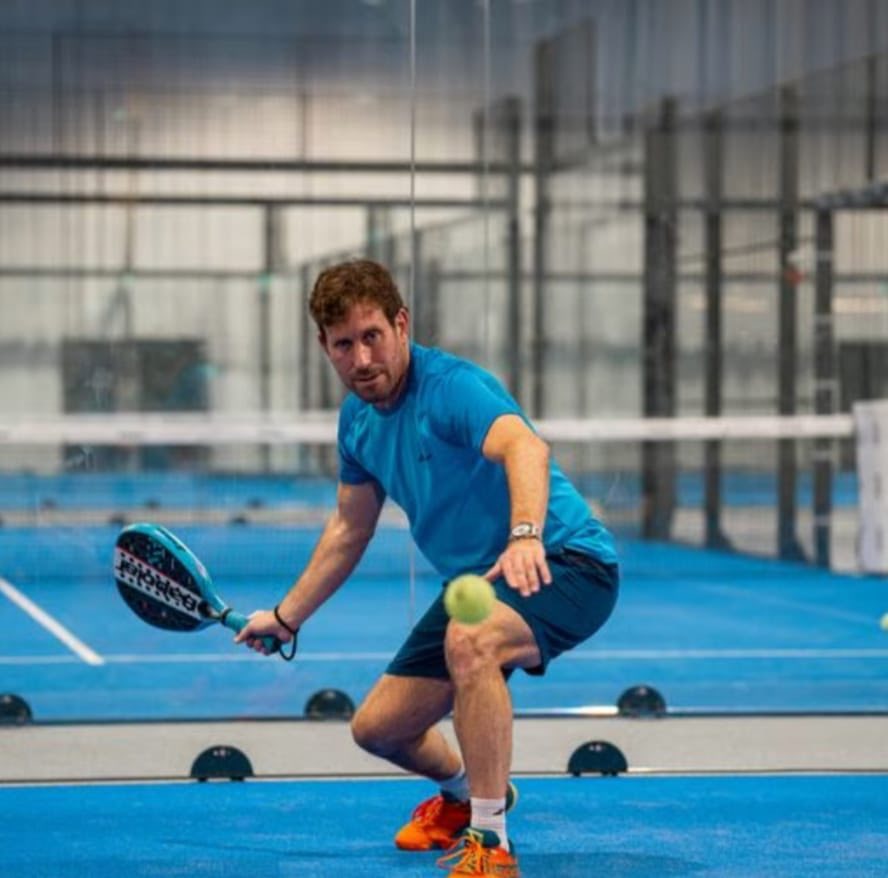
Quick facts
- From Argentina
- In Spain, he worked at SUNSET PADEL AREA Madrid in Madrid.
- Work as a padel coach in Sweden from 2020 to August 2023
- Currently working as a coach at Jungle Padel in Bali
- Japanese food is ramen
- Sweets lover
Life in Sweden
Eduardo, who loves sweet desserts and has been living in Sweden for almost three years, says, “Sweden is a very beautiful and wonderful country, but the long winters and snow are difficult for me, who grew up in a tropical country.” He smiled with warm eyes.
“Aside from the climate, I really enjoy working in Sweden as a padel coach. I feel very honored to be able to work in an environment where I can train students to play padel and a padel club that is among the highest quality in the world,” he says, somewhat seriously. There was a contrast in her expression.
About the current padel boom in Europe
Having experienced the padel boom in the 1980s in his home country of Argentina, Eduardo now wonders how he sees the padel boom in Europe.
“This boom is similar to the padel boom I experienced 40 years ago in Argentina. Padel is really fun and you can make friends with people from all over the world through padel. I think it’s really wonderful for the people who work there to be able to connect the world through padel like this,” he said passionately about the appeal of padel.
That’s exactly right. Since I first started playing padel, I have met countless people and made connections in various countries that I never imagined possible. I really can’t wait for the padel boom to hit Japan in earnest.
This padel boom is similar to the one I experienced 40 years ago in Argentina. Padel is really fun and you can make friends with people from all over the world through padel.
What happens to Eduardo when he loses?
Eduardo, who had a gentle smile on his face from start to finish, seemed to be having fun telling his padel story, and I asked him how he felt when he lost the game. “I’ve been playing a variety of sports since I was little, including tennis, handball, and soccer, so of course I’m very competitive and like to win. When he has the opportunity to play against players on the World Padel Tour, he plays with an unusually strong desire to win. On the court, I just want to win, but even if I lose, when I step outside the court, I forget about it and move on. ‘ His natural cheerfulness could be seen.
Memories of padel in Japan
Eduardo visited Japan for three consecutive years between 2017 and 2019. For his first two years, he traveled to Japan to hold a padel clinic that he personally organized. For the third time in 2019, he came to Japan with his contracted sponsor, BABOLAT, and held an event with Juan Lebron, who many people who love padel will know.
“In Japan, I went to Tokyo, Chiba, Osaka, and Nara.I was happy that all the Japanese people I met at the Japanese padel club really wanted to learn padel and were enthusiastic about it,” Eduardo said during the interview. He talked about his fun time playing padel with a smile on his face. He also felt firsthand the desire of Japanese padel players to play padel. .
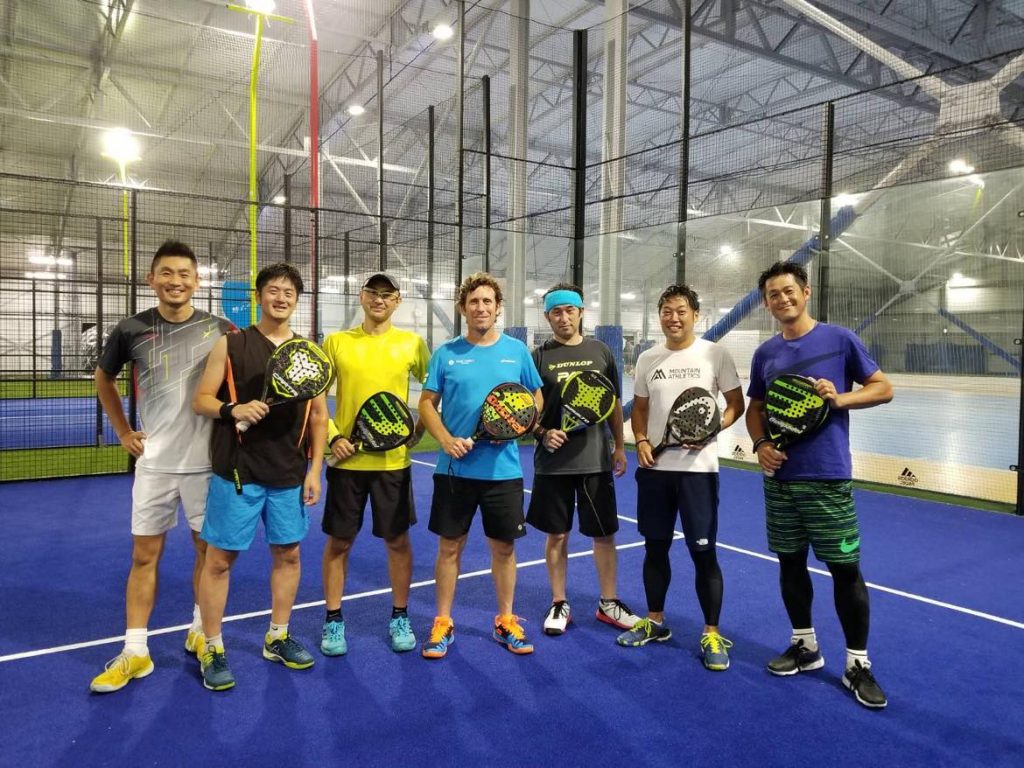
I’m really happy that foreigners who come to Japan think of Japan so positively. In Japan, Eduardo met many people through padel, and created many memories by spending a lot of fun time with Japanese padel players both on and off the padel court.
“Comparing the level of Japanese padel back then to now, the level of padel has definitely improved.And above all, the Japanese people are very kind and nice people, and it was a great time.”He went on to praise Japan. It was given to me. The reason he has such fond memories of Japan is probably because Eduardo himself has a wonderful heart. Everything is the law of mirrors.
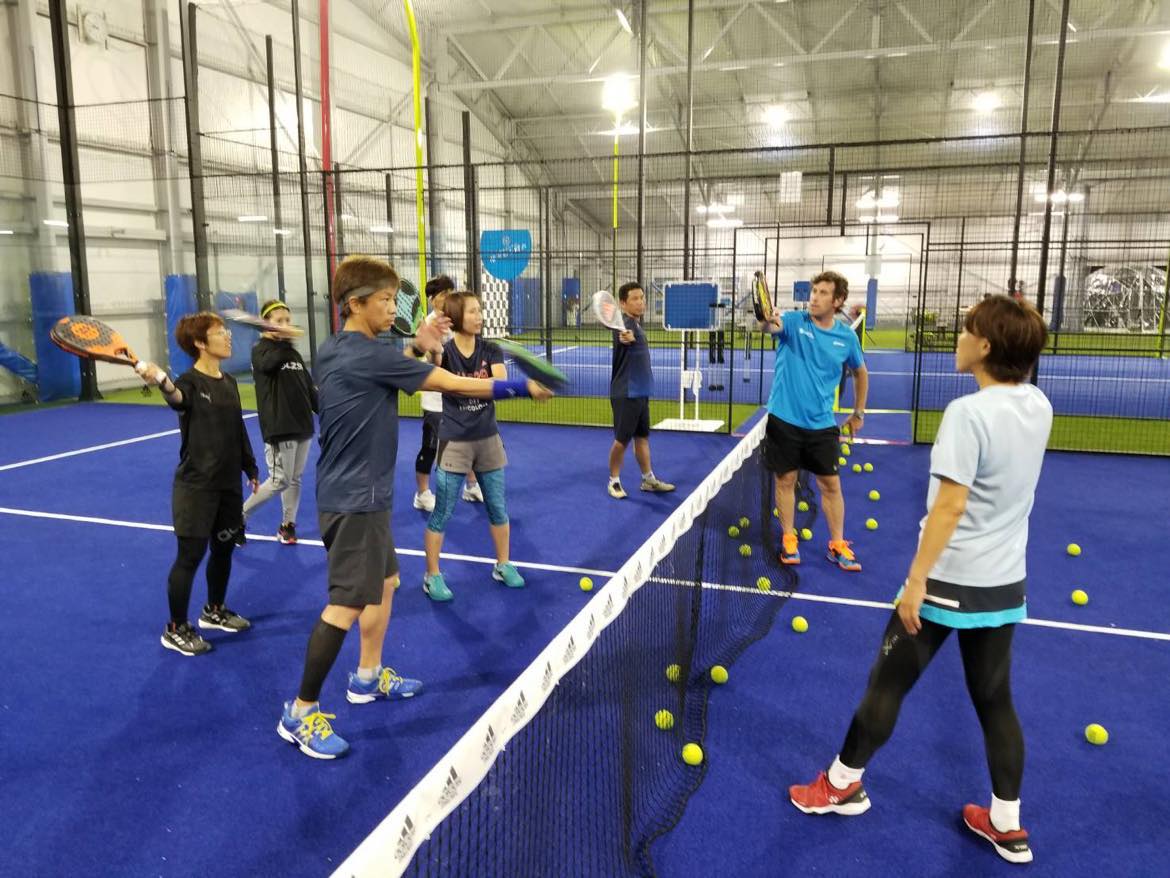
“Japanese padel is definitely improving.
What was the culture shock like in Japan?
This is a standard question asked to foreigners visiting Japan, but I decided to ask one that was interesting.
“When I went to Tokyo, I was surprised to see huge waves of people all walking in the same direction, and people lining up in a line outside restaurants,” she said happily. It’s a common question, but I’m sure I’m not the only one who is interested in what kind of impression Japan leaves on people who come from overseas, even though we are used to seeing Japanese scenery on a daily basis. .
What would you like to do next time you come to Japan?
“I’ll do what I want to do at the time. I’ll play padel with a lot of people and give my best on the padel court, and then after that I’d like to explore the cities of Japan and eat lots of delicious food, including lots of sweets.” ” Eduardo, who has a sweet tooth, answered happily. By the way, he says that his favorite Japanese food is ramen. Next time Eduardo comes to Japan, I would like to take him to his café, which has a delicious ramen restaurant and delicious desserts.
“I just want everyone to enjoy my lessons and have fun with everyone after padel,” says Eduardo, never forgetting the social fun that padel is all about.
I’m looking forward to the moment when Eduardo sees Japanese padel, which has definitely improved in level over the past few years.
Where will you be active as a coach from now on?
Is it possible that the day will come soon when Eduardo, who has had so much interaction with Japanese padel, will live in Japan and teach padel? Of course, he happily replied that there was a great possibility of that happening.
“I’ve always wanted to teach padel in Asia. After I finish teaching padel in Sweden, I’ll think about the next place.” Eduardo answered with a relaxed smile, making me think of him as a padel missionary. . We look forward to seeing in which country Eduardo will be based in the future to train padel!
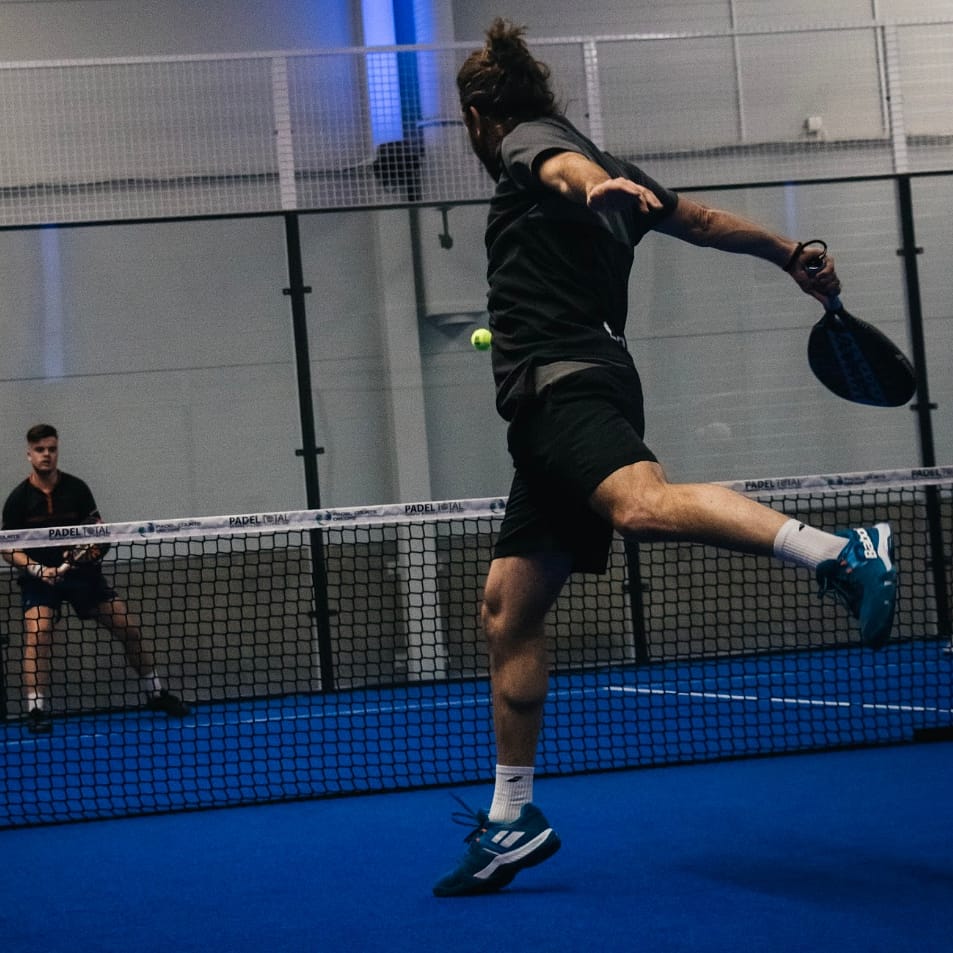
Do you speak Japanese?
“I can’t speak Japanese at all. I’m in Sweden now, so I’m studying using a Swedish app, but it’s difficult. So Japanese is probably even more difficult. It’s difficult to learn new words at this age. “Yo,” he said with a shy smile. The only thing that made staying in Japan a little inconvenient was the language barrier.
Even during padel lessons, I often needed an interpreter. Among them, Koji Nakatsuka, president of the Japan Padel Association,helped Eduardo to translate to Japanese. As someone who lives overseas, I can understand the sense of relief you feel when you meet someone who can translate when you are abroad and don’t understand the local language.
At that time, the padel population in Japan was smaller than it is now, but as the padel population has increased, there are now many padel players who want to learn Spanish. I’m sure you’ll enjoy conversing with people in Spanish at the padel club.
Eduardo would also like to once again thank MIKI (KITAGAWA MIKI) who helped with the local coordination when he first came to Japan. He talked about his feelings of gratitude towards MIKI.
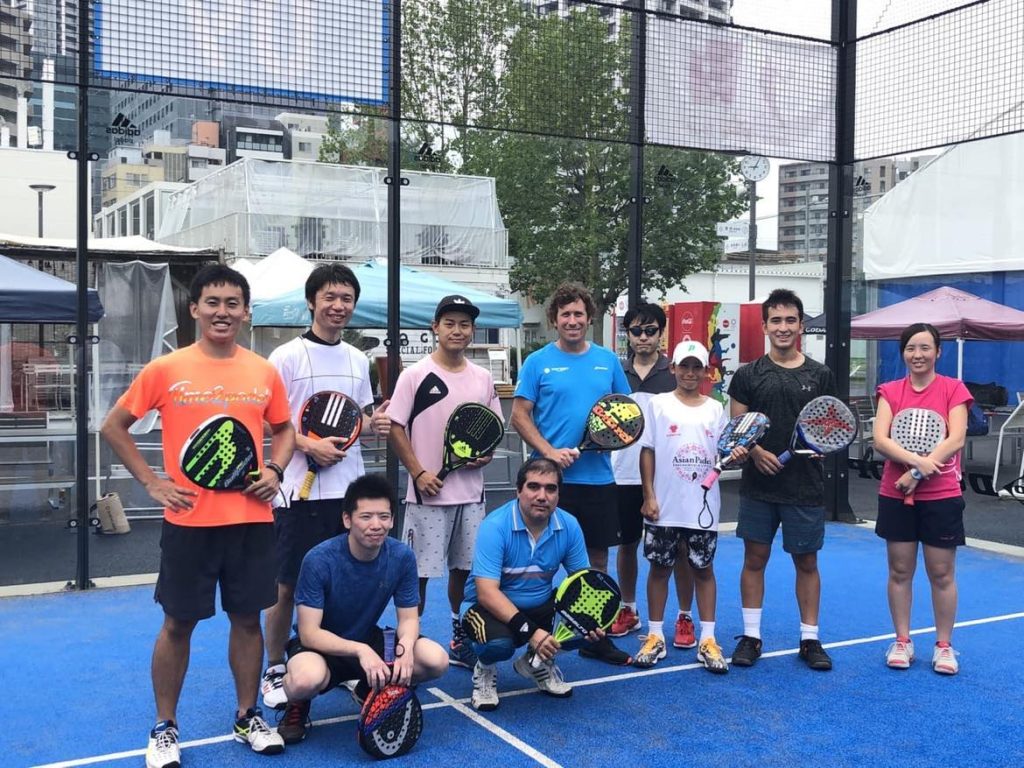
Finally, a message from Coach Eduardo to everyone who plays padel in Japan.
“Please continue to enjoy this wonderful sport and enjoy the social life you build through padel,” he said, sending encouragement to the Japanese padel world.
The best season has come for Sweden to shine green. After a long winter, it’s finally the season in Sweden where you can enjoy padel on an outdoor court under the sun. I’m sure Eduardo will be working hard today on coaching padel in this best season for his team.
Thank you for taking time out of your busy padel training to interview me. I look forward to seeing you next time on a padel court in Japan.
MEMO:
Eduardo’s Instagram infomation



